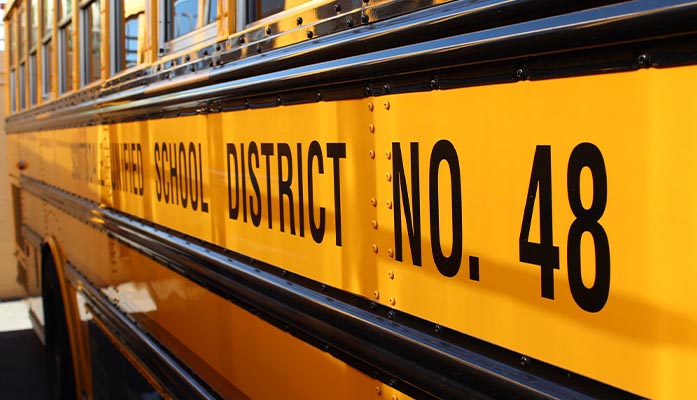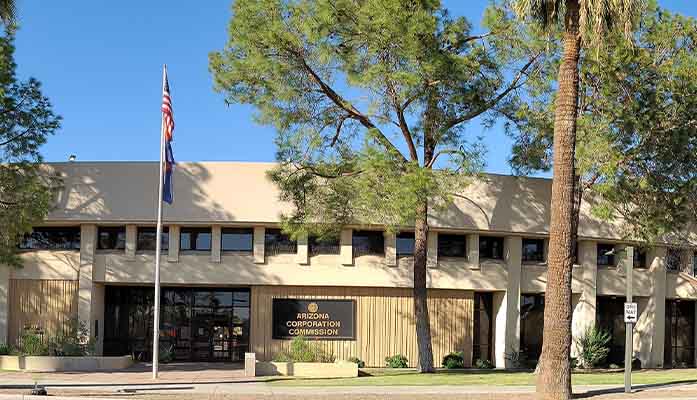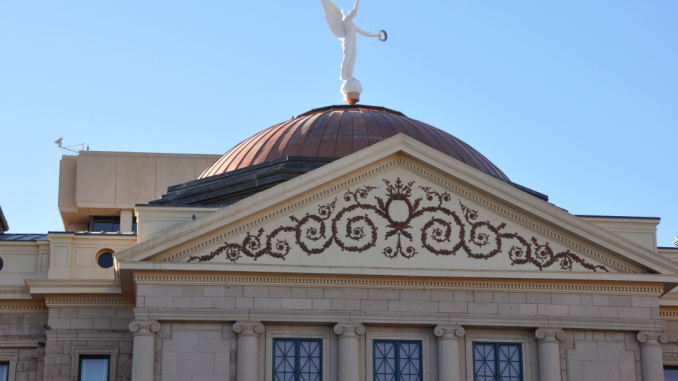
by Staff Reporter | May 5, 2025 | Education, News
By Staff Reporter |
The Scottsdale Unified School District (SUSD) may soon adopt a new American history curriculum rooted in social justice.
The SUSD Social Sciences Curriculum Adoption Committee recommended for American and Arizona History the textbook “US History: Interactive” by Emma J. Lapsansky-Werner, Peter B. Levy, Randy Roberts, and Alan Taylor from the Savvas Learning Company. This textbook, parents argue, reinvents modern American history through a social justice lens.
Parents took issue with the portrayal of complex issues in recent history, such as race relations in America. The textbook conveys that racism against Black Americans remains an ongoing problem.
“Although Barack Obama’s election as president showed that real racial progress has been made, other events during his presidency suggested that racism remained a problem in the country,” states the textbook.
The textbook also states that law enforcement killed George Floyd in 2020. Their coverage of this pivotal incident omits critical context to include the medical examiner’s office autopsy report, which cited Floyd’s heart problems exacerbated by regular drug use as well as the presence of “a fatal level” of fentanyl (along with the presence of other illicit drugs) in his system as contributors to his death.
“If Mr. Floyd were found dead in his home (or anywhere else) and there were no other contributing factors he would conclude that it was an overdose death,” stated notes from the prosecution’s interview with Baker.
During the trial of the police officer charged with Floyd’s death, Derek Chauvin, the medical examiner behind Floyd’s autopsy, Andrew Baker, concurred that Floyd’s corpse bore no evidence of asphyxiation — consistent with his autopsy findings. Baker’s autopsy report didn’t attribute law enforcement actions to Floyd’s cause of death; Baker only added that connection after watching videos of law enforcement restraining Floyd.
The textbook also characterized Black Lives Matter (BLM) movement as an offshoot of the Civil Rights Movement and described BLM protests as “generally peaceful”; the book distanced the riots that occurred from BLM activism.
“[D]estructive riots did break out in some cities at night, often after an announced curfew. During this nighttime rioting, people burned buildings, looted stores, and clashed with the police. Innocent people were harmed. It was unclear in some cases, however, whether or not the rioters were associated with the protests,” stated the textbook.
During a board meeting last month, the committee explained they recommended this and the other four social sciences textbooks based on alignment with course descriptions, comprehensive resources, support for diverse learners, online platforms, print and online access, and competitive pricing and staff development.
Parents and community members opposed to the textbook issued written comments to the committee arguing it was filled with “biased narratives” on critical topics in modern American history.
“This is exactly what parents do not want for their children and is why they are moving out of the public school,” stated one community member.
The controversial textbook would cost the district about $146,000 out of the $674,000 total requested purchase.
The curriculum committee members are SUSD teachers Ashley Crose, Daniel Hyman, Arianna Fiandaca, Brittany Case, and Chris Haak; SUSD administrator Chad Johnson; and community member Brian Cieniawski. Committee support members included SUSD Director of Teaching and Learning Kimberly Dodds-Keran, Social Science Academic Coach Dylan Bullard, and Instructional Materials Specialist Dede Johnston.
The SUSD Governing Board will vote on the curriculum during its May 13 board meeting.
AZ Free News is your #1 source for Arizona news and politics. You can send us news tips using this link.

by Staff Reporter | May 3, 2025 | News
By Staff Reporter |
A commissioner with the Arizona Corporation Commission (ACC), Nick Myers, denies a power company is to blame for a woman’s death.
82-year-old Kate Korman died last May less than a week after the Arizona Public Service (APS) shut off her power for failure to pay. Per APS, Korman ceased paying in January and owed around $500.
The medical examiner’s report attributed Korman’s cause of death as chronic alcohol use with heart disease listed as a contributing factor and declared the manner of her death to be an accident caused in part by exposure to elevated temperatures.
ACC prohibits power shut offs based on a certain timeline — June 1 through October 15 — not based on temperatures. APS does offer a program allowing family members to oversee their loved one’s bills.
Myers opposed modifying policy to implement temperature-based shutoff restrictions. The commissioner also said the current shutoff restrictions have caused more problems than it aimed to solve.
“We are already at a point where the policies we have in place are causing massive debt within our lower income communities (an unintended consequence of those policies) and therefore I believe, and am attempting to verify, that the mental stress is actually CAUSING more deaths than they are saving (by way of suicides increasing). Furthermore, much of that debt, millions of dollars of it actually, are ultimately being transferred back to the rest of the customers, increasing bills, which is actually exacerbating the underlying problem of people not being able to pay their bills,” said Myers. “In a nutshell, at some point people (and their families, and possibly their communities, like churches) should be responsible, it shouldn’t all fall on utilities and the ratepayers of utilities. It’s ultimately an unsustainable catch-22, and we are possibly seeing that we are at that cusp right now.”
Myers defended APS in response to criticisms made by Jonathan and Adam Korman, the sons of the deceased woman. Korman maintains his mother died due to temperatures inside her home, and that APS bears responsibility for shutting off her power.
Myers asserted there existed no further remedies to mitigate heat exposure due to shutoffs. Myers indicated there were further details about the elder Korman’s death that would have cast her in a negative light.
“Alcoholism killed your mother, heat may have been a contributing factor, but the utility did go above and beyond what we require. There really are no more practical methods that can be implemented at this point,” said Myers. “We did address it and trust me, I’m sure the family doesn’t want made public what we found. This is another case where the utility did above and beyond what they needed to, and more importantly the shutting off of power for non-payment was NOT the cause of death.”
Myers also said the elder Korman’s children bore some of the responsibility for her death, since they were not keeping an eye on her.
“So you are really going to come after us, who have no control over the situation, when you failed to protect your own mother, even though there were multiple tools in place for you to use for that exact purpose?” said Myers. “I’m not just blaming your mom, I’m more blaming you for not looking out for your elderly mom. I refuse to tell utilities that they have to provide power to people that do not pay their bills. To be honest, I’m not even happy about many of the programs that they have in place to help, but I understand the need for them. The only problem is the customer, and their family, have to actually reach out to take advantage of those programs. Again, I am sorry for your loss, but you have to take responsibility here. This is not a problem that the rest of society should shoulder.”
AZ Free News is your #1 source for Arizona news and politics. You can send us news tips using this link.

by Staff Reporter | May 2, 2025 | News
By Staff Reporter |
The Arizona Department of Agriculture (AZDA) plans to remove masses of the Salt River wild horses despite protesters citing protections for this population codified nearly a decade ago.
The Salt River Wild Horse Protection Act, signed into law by former Governor Doug Ducey in 2016, prohibits the harassment, shooting, injuring, killing, or slaughtering of the horses. It also prohibits individuals from interfering with, taking, chasing, capturing, or euthanizing the horses without written authorization from the state or county sheriff for humane purposes. The law does allow for the state to enter into contracts with the United States Forest Service and a private entity to “address any issue” concerning this horse population.
Advocates for the Salt River wild horses say AZDA’s new plans to outright remove them would not be humane and therefore not allowed by the law.
AZDA’s new request for proposal (RFP) for a new management company to mitigate the horse populations requires outright removal of the wild horses instead of the gradual, ongoing efforts to shrink the population. AZDA wants the number reduced to about 100 horses by removing or adopting out three horses for every new horse born. There are less than 300 that live on the river at present.
The Salt River Wild Horse Management Group (SRWHMG) is the current management company looking after the horses. SRWHMG did reapply for the new AZDA RFP despite disagreeing with its removal provisions. SRWHMG president Simone Netherlands announced it has purchased 34 acres in order to establish a retirement sanctuary for the removed horses if awarded the contract.
Ideally, SRWHMG want to continue using its more “humane” approach for reducing the wild horse population. The management company currently uses a form of birth control to shrink the horse population. SRWHMG reported the population declined by about 40 percent in six years: from 460 to 2019 to around 260 presently.
“Even if you adopt a horse out, it sounds very nice but it’s very hard to find good adopters for completely wild horses because they’re very costly, they’re very hard to train, and the horse is truly not going to be happy standing in a 12×12 stall when they have the most beautiful life here on the lower Salt River,” Netherlands told Fox 34.
However, SRWHMG’s method hasn’t proved fast enough for the state. AZDA defended the removal requirement as a means of more immediate resource mitigation in a statement.
“The humane management of the herd, including population reduction to match the available resources of the Salt River where they live, is an ongoing effort,” said AZDA.
Members of the public have expressed fears that these removals would mean poor quality of life or even death for the wild horses. Protesters worry that one competing bidder, Rail Lazy H, would send removed horses to a fate similar to those managed under her in past contracts, such as the Alpine wild horses sent to a slaughter auction in Texas.
AZ Free News is your #1 source for Arizona news and politics. You can send us news tips using this link.

by Staff Reporter | May 1, 2025 | News
By Staff Reporter |
President Donald Trump issued an executive order on Monday ordering an end to in-state college tuition for aliens — the very policy endorsed by Republican gubernatorial candidate Karrin Taylor Robson.
Robson advocated for the passage of Proposition 308 in 2022: the proposition extending in-state tuition rates to illegal aliens protected from deportation by the Deferred Action for Childhood Arrivals (DACA) program, usually referred to as “Dreamers.”
Robson was featured in a commercial by “Yes on 308” advocating for Proposition 308’s passage. Robson argued Dreamers provided a fiscal benefit to the state.
“It will improve Arizona’s economy by keeping skilled workers here in Arizona – kids we’ve already invested in for years, with zero tax increase,” said Robson.
Robson also signed onto a letter alongside over 50 Arizona Republican leaders advocating for aliens as critical members of the workforce.
Proposition 308 passed narrowly thanks to millions in dark out-of-state funds.
Trump’s executive order ordered an end to these college tuition benefits, claiming these and other similar policies qualified as unequal treatment of Americans. Trump directed Attorney General Pam Bondi and Secretary of Homeland Security Kristi Noem to end state and local laws, regulations, policies, and practices which favor aliens over American citizens.
The Attorney General, in consultation with the Secretary of Homeland Security and appropriate agency heads, shall identify and take appropriate action to stop the enforcement of State and local laws, regulations, policies, and practices favoring aliens over any groups of American citizens that are unlawful, preempted by Federal law, or otherwise unenforceable, including State laws that provide in-State higher education tuition to aliens but not to out-of-State American citizens that may violate 8 U.S.C. 1623 or that favor aliens in criminal charges or sentencing.
Of note, Trump endorsed both Robson and her Republican primary opponent, Congressman Andy Biggs. Dual endorsements aren’t rare for the president, though Trump’s endorsement of Robson occurred prior to Biggs entering the race.
Arizona Republican leadership opposition to Robson’s campaign prompted Robson to unregister as a lobbyist earlier this year.
Shortly after Trump’s executive order, Biggs backed the move to end in-state tuition for Dreamers. The congressman also cited his support for a bill by Congressman Paul Gosar to prevent illegal aliens from receiving benefits restricted to American citizens.
“President Trump is right – US citizens shouldn’t pay more for college tuition than illegal aliens,” said Biggs. “I stand with President Trump on securing the border and ending policies that incentivize illegal immigration.”
Arizona’s legalization of in-state college tuition for illegal aliens resulted in the increased influence of dark money operations. These opaque cash flows have funneled into scholarship programs offered by the state’s universities.
Arizona isn’t the only state to grant this privilege to aliens. About half of the country and the District of Columbia also allows illegal aliens to pay in-state tuition for public colleges and universities including California, Colorado, Connecticut, Florida, Hawaii, Illinois, Kansas, Kentucky, Maryland, Massachusetts, Minnesota, Nebraska, Nevada, New Jersey, New Mexico, New York, Oklahoma, Oregon, Rhode Island, Texas, Utah, Virginia, and Washington.
AZ Free News is your #1 source for Arizona news and politics. You can send us news tips using this link.

by Staff Reporter | Apr 30, 2025 | News
By Staff Reporter |
The Arizona Republican Party’s former treasurer and GOP candidate for the 2026 state treasurer’s race warned lawmakers against Governor Hobbs’ nominee for the Arizona Department of Insurance and Financial Institutions (DIFI).
In a letter to Arizona state senators, state treasurer candidate Elijah Norton said that Hobbs’ DIFI nominee, Barbara Richardson, not only displayed troubling behavior during her two Director Nominations (DINO) committee hearings but had a poor performance record as director of DIFI. Norton owns multiple insurance and insurance-related businesses regulated by DIFI — some of which he says have been targeted by Richardson in the past.
Norton alleged that Richardson retaliated against him for testifying before DINO against her by asking the agency she formerly led — the Nevada Department of Insurance (NDI) — to investigate him. Norton said that one week after his DINO testimony, his company received an email from NDI demanding an National Association of Insurance Commissioners (NAIC) biographical affidavit.
“I believe that Ms. Richardson contacted a mid-level sympathetic bureaucrat in her old office and asked them to do this in retaliation for the well-documented part I played in bringing several issues to light that resulted in her failing the DINO confirmation vote,” said Norton.
Norton further attested that one day after he went public to Arizona lawmakers and political leaders about the NDI request he believed was prompted by Richardson, NDI called him to retract their request and ask instead for his Social Security number — information which NDI has had on file for over a decade, per Norton.
“The person on the phone sounded very nervous, and it appeared to me they were trying to ‘cover their tracks,’” said Norton.
According to Norton, this retaliation wasn’t new to him — or others. Norton also alleged Richardson targeted not only him but Barry Goldwater Jr. (son of late Senator Barry Goldwater) in the past with “regulatory retaliation.” According to Norton, Richardson banned him from calling the NDI while she was the Nevada Insurance Commissioner because he challenged a certain regulation. Goldwater Jr. allegedly faced similar problems after he voiced his opposition to Richardson to Arizona Senate leadership.
“[I] pushed back on a ridiculous minor change on a form that was going to cost my company over $10,000 and over 100 hours of time due to one of her unreasonable bureaucrats wanting me to underline one immaterial sentence — that would require me resubmitting the form to all of the various states. The requested change wasn’t even contained in the statute, rather the bureaucrat relied on the ‘promulgation clause’ (resembling the way she abused SERFF in Arizona),” stated Norton. “She retaliated by sending me a letter saying I was ‘banned’ from calling the Nevada DOI (despite paying them over $1,000 per year in regulatory fees), simply because I pushed back against an unreasonable regulation – violating my constitutional rights. This is the only time in my entire career this has occurred before and since.”
Norton also alleged Nevada lost its NAIC accreditation under Richardson, but available records reflect the state maintained its accreditation.
Norton also revisited key points of concern raised by Republican lawmakers over Richardson’s time as DIFI director during the first DINO hearing last month. Hobbs appointed Richardson to the DIFI position in March 2023.
In the first DINO hearing, Richardson was questioned about her service as chairwoman to a NAIC committee which considered variable insurance pricing based on race. The committee dissolved a day before her first DINO hearing last month.
That first hearing also revealed that, under Richardson’s directorship, System for Electronic Rate and Form Filing (SERFF) abuse occurred, significant increases to licensing times piled on, and services rendered decreased continually — of note, DIFI was found to have restricted its licensing hotline to voicemail only at certain times under Richardson’s tenure.
AZ Free News is your #1 source for Arizona news and politics. You can send us news tips using this link.





